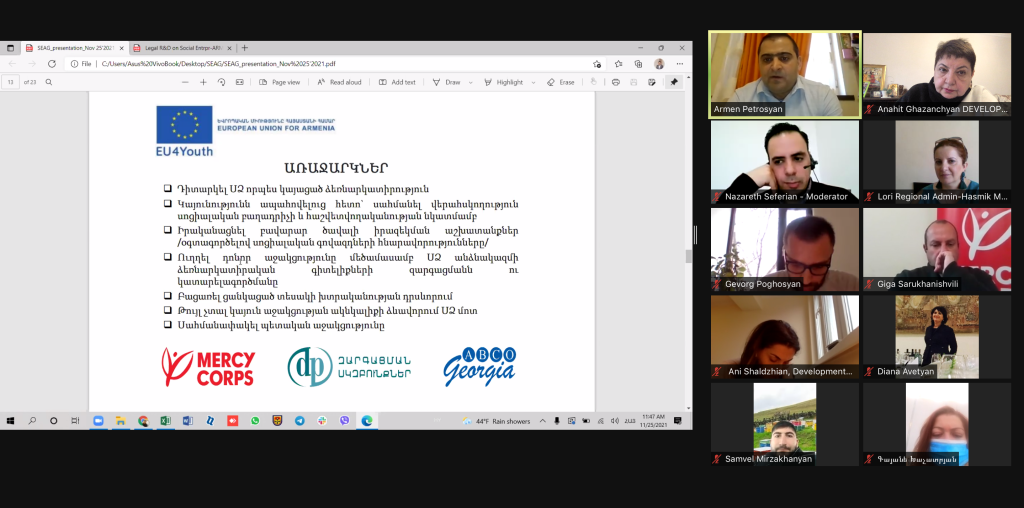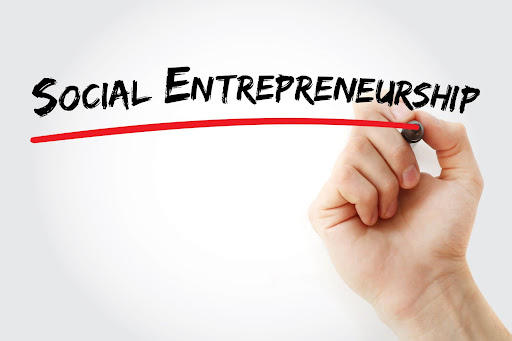November 25, 2021
Within the framework of the EU-supported EU4Youth Initiative, the Armenian NGO Development Principles, in partnership with Mercy Corps International and the Georgian Association of Business Consulting Organizations (ABCO), has been implementing Social Entrepreneurship in Armenia and Georgia (SEAG) project to involve young people in initiating social change through social entrepreneurship.
On November 25, 2021, Development Principles NGO organized an online conference on the social entrepreneurship ecosystem in Armenia, in particular about the opportunities to build a legal framework for the development of the social business model in Armenia. At the beginning of the meeting president of Development Principles NGO, Mrs. Anahit Ghazanchyan, presented the main objectives of the SEAG project, and introduced the conference’s main topic. She mentioned that the organization did respective research on the social entrepreneurship ecosystem in Armenia and the findings will be presented at the conference together with the recommendations.
With the opening remarks spoke Frank Hess, the representative of the EU Delegation, who highlighted the importance of social entrepreneurship in Europe and the world as a helping hand to the governments to tackle social issues of the communities. Giga Sarukhanishvili, the director of the EU4Youth SEAG regional cooperation project, greeted all participants from Georgia and spoke about the SEAG project’s third output which relates to the improvement of the ecosystem for the development of social entrepreneurship in Armenia and Georgia.
The conference was moderated by Nazareth Seferian, the European Venture Philanthropy Association’s “Collaborate for Impact” project’s manager. He started the conference’s discussion by pointing out the main issues and questions faced, along with the main points of the conference agenda.
In the first session, Diana Movsesyan, lawyer, CEO & Founder of MODIKA, briefly presented the research paper about the “Opportunities to build a legal framework for the development of the SE’s.” The main points of the research paper are:
- SE concept, general description, the current situation in RA
- Proposals for effective business and ecosystem development in SE today.
Apparently, what needs to be fixed is to define and come up with a certain, specific concept for the definition of SE’s and terms by which businesses can be identified as SE’s.
Armen Petrosyan, a financial expert from DP NGO presented the second part of the presentation. He presented points about the following:
- Legal overview, tax, and legal aspects of SE’s and ecosystem development
- Overall conclusions about the business thinking, organizational structures, discrimination policies, and unhealthy entrepreneurship that abuse social issues
- Suggestions for improvements: view and treat SE organizations as real businesses, demand internal reports on social effects and finances, do advertising campaigns and social ads, redirect donors support’s focus on SE founders and workers skills improvements, limit government support, do not let SE business owners expect stable financial support from outside organizations and sponsors.
After the presentation of the research paper, Nazareth Seferian presented the list of questions on which further discussions were held. Limits for volunteering activities, shadow economy and related risks, the importance of volunteers for Armenian SE’s, possible next steps were discussed.

One of the main risks pointed out is discrimination against enterprises for profit because if SE’s get to have volunteers in the profitable work part of the business, then businesses not in the SE industry will spend more money on production. Mr. Rafayel Gevorgyan from the Ministry of Economy RA answered the first question related to the volunteers saying that their Ministry is ready to support reasonable changes proposed that will relate to SE’s and volunteers’ engagement in the commercial activities. Gevorg Poghosyan, the CEO of Impact Hub Yerevan shared his vision on the importance of volunteers for positive changes. Hasmik Mkrtchyan, Head of the Development Programs in Lori Regional Administration RA, pointed out challenges and proposed solutions for SE’s. Afterward, Haykuhi Gevorgyan from the Ministry of Labor and Social Affairs, also the founder of the “Career Lab”, pointed out that the law about the volunteers is still in the discussion process. Therefore, they can still decide on criteria by which some businesses can and cannot engage volunteers in their activities. The next steps that could be taken include changes in legislation, more profound discussion on the issue, and young volunteers’ engagement strategies, along with accepting a certain set of criteria by which business can be defined as social entrepreneurship.
Conference’s agenda also included parts about SE’s financial statements and reporting schemes, including discussion about state role in developing new financial mechanisms, the whole concept of SE’s being irrelevant if they are grant dependent, and the impact on other businesses and the overall economy. During the discussion, Hasmik Mkrtchyan and Haykuhi Gevorgyan agreed that SE’s could use some support, including financial assistance, and that it would be motivating for founders to establish businesses that may have social impact. Also, from their perspective, the government can show more involvement in contribution and support into the SE industry because SE’s have a social impact on socially challenged people, youth, environment, etc. Nazareth Seferian pointed out that there are some options for financial assistance and grants for newly established SE’s & start-up SE’s, and very few for those who have been operating for a few years and need to use some finances to expand. Most of the participants agreed that many SE’s dependent on grants which represent a certain risk for their development as social businesses. The next steps discussed were implementing certain strategies and criteria based on which SE’s can get financial assistance. Also, strategies to increase the visibility of SE’s may help them make a profit while having a social impact and will mitigate the risk of their dependence on grants and financial assistance.
The next point of discussion was social advertisements, including public service announcement/ effectiveness of social ads in overall, risks of freedom in social ads, and possible next steps. The next steps discussed were increasing visibility and brand awareness by using social ads and offering high-quality customer services/products in order to improve public image. But during the discussion experience shared by participants such as Gayane Khachatryan, who has her social enterprise Apricot, shows that social ads are not that effective for the Armenian market. Aida Atabekyan from ARMENECOOP/YCCD also agreed with Gayane by sharing her experience; during the meeting, she said that social ads and awareness of the social impact of social businesses mostly affects international visitors rather than the Armenian market. Another possible step that can be taken is to use social advertisement possibilities fully, implement different strategies and innovative solutions and show how the social business meets both customer and society needs, as well as customize those ads in order for them to work on the Armenian market/audience.
The last point discussed at the conference was about the responsibilities of SE’s, including discussion on obstacles to SE reporting to the state and the public. A possible next step discussed and agreed upon by participants was informing SE’s on the mandatory internal reports of their finances and auditing the social impact on a yearly basis.
The online conference was concluded with the closing remarks on the next steps. Development Principles NGO is committed to finalizing the research paper with recommendations taking into consideration also the comments and suggestions received from the participants of the online conference. The white paper will be presented to the Government of Armenia and the Standing Committee of the National Assembly of Armenia for further proceeding aiming at improving the ecosystem for social entrepreneurship development in Armenia.

